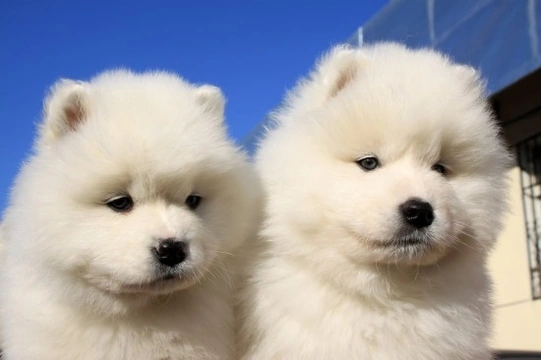
Some more information about the Samoyed dog breed
The Samoyed is a very distinctive dog that has a big, fluffy white coat that is a joy to stroke! They are also generally very personable and friendly, and really enjoy the attention. As one of the most ancient of recorded dog breeds, the Samoyed is recognised across the world by all of the major Kennel Club registries, and are popular as pets in a great many countries, including the UK.
Gentle in temperament, hardy, energetic and full of personality, the Samoyed can be an excellent family pet for experienced owners, and certainly one that is worthy of consideration if you are thinking of buying a dog. Read on for a little more information about the Samoyed dog breed.
Samoyed history
The Samoyed dog as we know it today descends from the Nenets Herding Laika dog, a Spitz-type dog that hails from Siberia. Originally, the breed was used as a sled dog to traverse Siberia’s frozen wastelands, and for herding, guarding, and cuddling up to at night!
DNA analysis of the genes of the breed reveal that the Samoyed is one of the fourteen most ancient dog breeds, along with the Chow Chow, Siberian Husky and Alaskan Malamute. The Samoyed has a recorded history of working alongside of people going back for at least 3,000 years.
The Samoyed coat
The coat of the Samoyed dog is very thick, and consists of two distinct layers. The topcoat is long and relatively coarse, with thick, straight guard hairs. The undercoat is made from very dense, soft fluffy fur, which provides insulation and keeps the dog warm.
Like many dogs from within the Spitz grouping, the Samoyed is renowned for being a heavy shedder, and will usually fully blow their coats once or twice a year. The coat is most commonly pure white in colour, but can also come in a light biscuit shade, or a mixture of white and biscuit.
The Samoyed fur can also be used for knitting, in place of wool! It has a very soft texture that is similar to angora, and is hypoallergenic and very warm!
General appearance
The Samoyed can weigh up to 30kg, and stand up to around 22” tall at the shoulder. They have a typical Spitz-dog appearance, with a full length muzzle, bright, alert eyes, pointy ears and a distinctive curled tail that will often curve right over to touch the dog’s back.
Samoyed temperament and personality traits
The Samoyed is an incredibly friendly dog that really enjoys the company of both other dogs and people, and almost always gets on well with children. They are not particularly territorial, and make for terrible guard dogs as they are equally happy to meet strangers as well as people that they know well! However, they can prove effective watchdogs, and will bark to alert you when someone is approaching the house.
They are relatively lively and active dogs that enjoy plenty of time out of doors and long family walks, and they tend to remain fit and active well into old age. They do have a propensity to become easily bored, and also have something of a tendency to enjoy digging! They like to pull, and can easily be trained to pull a cart or a sled, but unfortunately they also have a rather marked tendency to pull on the lead too! They have reasonably strong herding instincts, so care must be taken when out walking around farm animals. They may even attempt to herd children or the family cat if permitted to as well!
Samoyed health and longevity
The average lifespan of the Samoyed dog is 12-13 years, putting them around the middle of the age range for purebred dogs of a similar size. As the breed is so well established and comes from a wide and diverse gene pool, the Samoyed is generally a healthy and fit dog that is not likely to succumb to a wide range of minor ills.
They do, however, have a slightly elevated genetic predisposition to a few health conditions, including Samoyed hereditary glomerulopathy, which is a renal condition that most commonly affects males of the breed, and can lead to renal failure. Females can be carriers for the condition and may also be affected by it, although to a much lesser degree than males.
Diabetes, progressive retinal atrophy, pulmonic stenosis and hip dysplasia are some other inherited conditions that can affect the Samoyed as well.
Samoyeds as part of the family
The Samoyed makes for an excellent family dog, and one that gets on well with other pets and also children. They enjoy family life and being involved in everything, and need plenty of stimulation and exercise. As an intelligent dog, the Samoyed does require an experienced trainer to keep up with the dog’s sharp mind, but when correctly trained, they can retain a wide range of complex and high level training commands, making them eminently suitable for a wide range of canine sports too.



